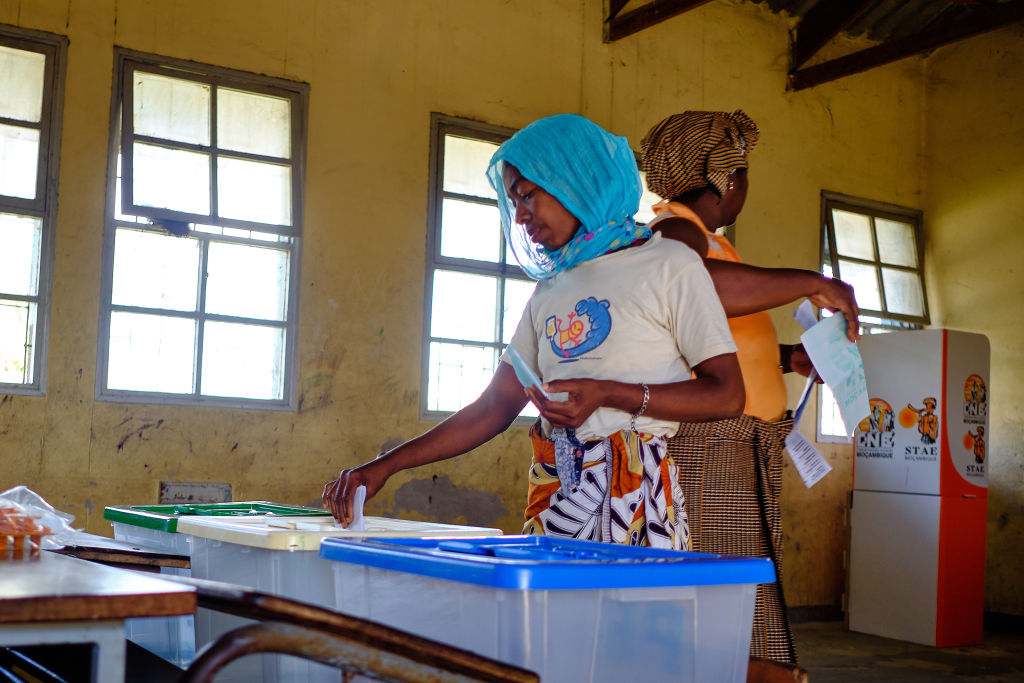The 2024 general elections in Mozambique seems to have highlighted tensions between the ruling party’s revolutionary past and present-day challenges as allegations of irregularities cast a shadow over the vote.
The 2024 general elections in Mozambique marks a pivotal moment in the nation’s political landscape.
Despite the backdrop of insurgency in the north and concerns raised by some observers, the long-dominant ruling party, the Mozambique Liberation Front (FRELIMO), is expected to secure a decisive victory, with preliminary reports indicating a lead in all 11 provinces, including the capital city of Maputo.
However, FRELIMO, which has governed the country since its independence from Portugal, almost half a century ago, reportedly faces growing scrutiny over alleged election irregularities. As the party seeks to retain control, it may contend with accusations of increasingly authoritarian rule and manipulation.
“This is a structural problem of election rigging,” says Borges Nhamirre, a political analyst at the Institute for Security Studies (ISS) to FORBES AFRICA, indicating that such issues are not new, adding, “the results from the polls are not the ones published by the electoral bodies”.
Loading...
A Contested Field
The presidential race featured several parties, including the ruling FRELIMO, the Mozambican National Resistance (RENAMO), and the Democratic Movement of Mozambique (MDM). Daniel Chapo, FRELIMO’s candidate, is set to succeed current President Filipe Nyusi, should the party obtain victory.
RENAMO, historically the primary opposition, appears to be losing some of its influence as indicated by preliminary vote reports. Meanwhile, MDM’s Lutero Simango and independent candidate Venâncio Mondlane have sought to challenge FRELIMO’s dominance, with Mondlane standing as a notable contender.
Access and Oversight
According to a preliminary report from the European Union Election Observation Mission (EU EOM), “There was a notable lack of confidence in the reliability of the electoral register and on the independence of the electoral bodies”.
In a press release issued recently, Laura Ballarín, Chief Observer of the EU EOM, noted that FRELIMO benefited from “the misuse of state resources”, creating an uneven platform for other parties. She added that their “observers reported a slow counting process which suffered from disorganization and lack of clarity”.
Despite these concerns, the voting process was described as orderly. The EU EOM deployed 179 observers across Mozambique, though Ballarín acknowledged the lack of confidence in “the reliability of the electoral register and the independence of the electoral bodies”.
The Southern African Development Community (SADC) also had a significant presence, deploying 53 observers from 10 member states.
Dr Amani Abeid Karume, Head of the SADC Electoral Observation Mission, emphasized that the elections would be evaluated against SADC’s Principles and Guidelines Governing Democratic Elections.
While both SADC and EU observers noted peaceful conduct on election day, access to polling stations was not without its challenges. Some observers were reportedly denied access – a trend Borges criticized. “Observers only covered 1% of polling stations, mostly in city centers, and didn’t witness the broader issues,” he suggests.
Irregularities and Allegations of Fraud
Reports of inconsistencies have raised questions about FRELIMO’s anticipated victory. Borges pointed to areas with more registered voters than the eligible voting-age population, describing it as a “manipulation” tactic. He also alleged non-citizen voting, saying it’s “not uncommon for Zimbabweans to vote”, reflecting long-standing concerns over Mozambique’s electoral integrity.
These irregularities were noted by both local observers and international missions.
A Country on Edge
The credibility of Mozambique’s election process remains under scrutiny, with frustrations reportedly growing among citizens.
The EU EOM plans to release a final report with recommendations in the coming weeks, which they hope will prompt electoral reforms. Meanwhile, SADC’s Karume has called on Mozambique’s political stakeholders to respect divergent political views and exercise responsibility, stressing the importance of stability.
As Mozambique navigates these challenges, the elections serve as a litmus test for the resilience of its democratic institutions and the extent to which the public will tolerate any perceived injustices.
Loading...
